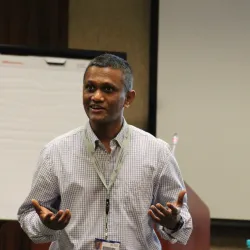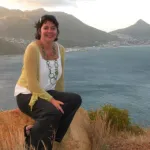
Master of Philosophy in Applied Epidemiology (MAE)
Australia’s Field Epidemiology Training Program (FETP)
Please note: The Master of Philosophy in Applied Epidemiology (MAE) Program places students in field placements in Australia, i.e. Australian Government Departments and State and Territory Public Health Units. To be eligible to be placed in these organisations, you are required to be an Australian citizen or an Australian permanent resident. If you do not meet these criteria, unfortunately we cannot consider your application.
Update: Applications open on 1 June 2025 and close on 22 July 2025.
This application portal is now open with instructions for submitting your application.
View "How to Apply". For more information, contact mae.nceph@anu.edu.au.
Notice: NCEPH will offer up to six fellowships from 2025 to 2028, known as the Pac-EVIPP+ MAE Fellowship, for selected Pacific Islanders working within Ministries of Health to undertake the MAE Program at the ANU. To be eligible for these fellowships, applicants must satisfy academic requirements of entry by the ANU. In addition, they must hold a current position with their local Ministry of Health and have the support of their workplace to under the Program.
Applications open 1 June 2025 and close 22 July 2025.
View “How to apply (Pac-EVIPP Fellowship)”. For more information. contact Pac-EVIPPplus.nceph@anu.edu.au
The Master of Philosophy in Applied Epidemiology (MAE) Program is Australia’s only Field Epidemiology Training Program (FETP). The program is TEPHINET-accredited, and part of a global network of FETPs strengthening public health systems. The MAE partners with and complements health department initiatives to enhance workforce skills, health system performance and evidence-based policies, programs and practice.
The program was established in 1991, modelled on the Epidemic Intelligence Service (EIS) at the US Centers for Disease Control and Prevention (CDC). Over time the program evolved and became a unique FETP to support Australia’s and the region's public health. In 2024 the program was reaccredited by TEPHINET with distinction and merit, which showed the high quality of the MAE program.
We are proud that fifteen percent of the MAE graduates identify as Aboriginal and Torres Strait Islander people. We celebrate and encourage diversity among scholars as we believe a diverse workforce can improve public health.
Key facts
- Admission requirements
- 22 months full-time
- Access to state-of-the-art facilities
- #1 in Australia for graduate employability (Times Higher Education)
- Frequently Asked Questions (PDF, 216KB)
Degree overview
MAE is a 22-months full-time program that uses an ‘on-the-job’ training approach where students spend most of the program working and learning within field placements typically a government health department or a research institute. While in their placements, scholars complete useful and important research projects based on the priority of the field placements and under the supervision of field and academic supervisors to meet the following competencies:
- Investigate an acute public health problem or threat (typically a disease outbreak);
- Analyse public health datasets (such as surveillance data);
- Establish or evaluate a public health surveillance or other health information system; and
- Design and conduct an epidemiological study.
The Master of Philosophy requires the completion of 30 units of coursework.
Download the degree flyer.
2026-2027 MAE Program Information Session
Careers
As the MAE is Australia’s TEPHINET-accredited program, the skills our graduates learn throughout their training are recognised around the world and place them in good positions for employment nationally and internationally. Our graduates have gone on to hold senior positions in federal and state health departments and public health units across Australia. Many have also worked for international organisations such as the World Health Organization (WHO), International Committee of the Red Cross, and Medecins Sans Frontieres (MSF) in both emergency response and ongoing roles. Some graduates also pursue academic and research roles, with employment opportunities at universities worldwide.
As a student at ANU, you gain access to the ANU CareerHub – an online career development and employability tool that includes a jobs board and careers resources. You also have access to drop-in chats with a career consultant and to attend our career fairs to meet potential employers.
Learning experience
Fees & scholarships
Scholarships
The Master of Philosophy in Applied Epidemiology Scholarship provides funding for students in Australian placements and is supplied via the field placements as a tax-free full-time scholarship of $66,908 per annum in year 2026 with an increase in year 2027 to $69,049 on a pro rata basis of scholarship duration.
Note: Scholarship duration is 09/02/2026 to 10/12/2027.
Key people

Dr Emma Field

Emma is the MAE Director. Emma's areas of expertise include Health Security and Health Systems. Emma has worked extensively in the Asia Pacific Region including the Philippines and Papua New Guinea. Emma co-ordinates the ASEAN-Australia Health Security Fellowship Program and convenes Public Health Surveillance for the MAE Program.
Learn more
Dr Davoud Pourmarzi

Davoud is the MAE program Curriculum Convenor. He is a Senior Fellow of the Higher Education Academy and has extensive experience in teaching and HDR supervision.
Learn more
Dr Rezanur Rahaman

Rezanur is a medical doctor with specialist training in field epidemiology, international public health, and infectious disease and environmental epidemiology. His research interests include infectious diseases, environmental epidemiology and climate change, zoonosis prevention and a One Health approach.
Learn more
Dr Sam Colquhoun

Sam is an epidemiologist with 20 years field experience in operational research and public health programs in resource poor countries. She has a strong interest in MCH, infectious diseases, NCD and vaccine research as well as health system strengthening in primary health care.
Learn more
Dr Amy Parry

Amy is the International Convenor of the MAE. She is an international field epidemiologist with experience in both acute and protracted humanitarian response settings. Amy is a graduate and staff member of the Australian FETP, with a background in anthropology and public health. Prior to coming back to Australia to commence her PhD focusing on epidemiology emergency response workforce strengthening, she worked in Cambodia with the WHO Health Emergencies Program (2013-2018), and in the Thai-Burma border refugee camps (2005-2008).
Learn more
Guddu Kaur

Guddu is an applied epidemiologist who has worked for the past 12 years primarily in the management of communicable disease events in low resource settings across Australia, Africa, Asia-Pacific and Central America. In her spare time, she can be found making questionable recipes she found online.
Learn more
Laura Vitler

Laura is the Senior Administrator/MAE Student Officer for the MAE. Laura has extensive administrative experience working in the Australian Government, and the ANU. She worked many years at the John Curtin School of Medical Research and the Director’s Office of the then Research School of Population Health (now NCEPH). She made a move to the NCEPH Student Office looking after HDR and coursework students. Laura brings all this experience to the MAE.
Learn more
Dr Rosalina Sa aga-Banuve

Rosalina is a medical doctor with over 30 years experience initially as a clinician then in regional and global organizations in health policy and program management in the Pacific. She is passionate about improving capacity in the field of applied epidemiology for all students both national and international.
Learn more
Stephanie Wheeler

Stephanie is a field epidemiologist and registered nurse who has worked with national governments and WHO to develop field epidemiology capacity in Cambodia, Solomon Islands and Papua New Guinea. She is particularly interested in the intersection of health security and social equity, and how we meaningfully engage communities in emergency preparedness and response.
Watch the webinar
World Field Epidemiology Day is a global movement raising awareness of field epidemiology’s vital role in protecting population health and strengthening global health security.
How to apply
Understand the entry requirements
Please note that the Master of Philosophy in Applied Epidemiology Program places students in field placements in Australia. To be eligible to be placed in these organisations you are required to be an Australian citizen or an Australian permanent resident. If you do not meet these criteria, unfortunately we cannot consider your application.
- Check the admission dates
- Applications open 1 June 2025
- Applications close 22 July 2025
- Referee reports due 28 July 2025
- Applicants typically have several years of relevant work experience and should have a bachelor degree with at least one upper second class honours, or a graduate diploma or master degree with significant research thesis component. Learn more about admission requirements.
- You must also meet the University's English language admission requirements.
Review the MAE Application Guide
The application guide provides step by step instructions for completing your application.
Prepare references & supporting documents
You need to submit the supplementary questions as a supporting document in your application. Email the referee report form directly to your referees, and request they complete the form and email it to mae.nceph@anu.edu.au by 28 July 2025.
- Address the four questions listed in your Application Guide
- Resume/Curriculum Vitae
- Academic transcripts
For questions specific to the application process email the MAE Student Office: mae.nceph@anu.edu.au.
Submit an application
Start your application on the ANU Apply website.
Attend an interview
Applicants will be shortlisted on the basis of their academic achievements and referee reports. If you're shortlisted, the selection committee will invite you to attend a personal interview.
Receive an offer
Applicants who are successful at the interview will be offered places in the program. If you're offered a place, you will have a short period to accept the offer.
Accept your offer
Once you receive an offer it is very important that you accept it to ensure your place at ANU is reserved.
Understand the entry requirements
- Check the admission dates
- Applications open 1 June 2025
- Applications close 22 July 2025
- Referee reports due 28 July 2025
- Applicants typically have some years of relevant work experience and a bachelor degree with at least one upper second class honours, or a master degree. Learn more about admission requirements.
- You must also meet the University's English language admission requirements.
- Please ensure you are familiar with what the Pac-EVIPP+ Fellowship entails.
Review the Applicant Guide
The application guide provides step by step instructions for completing your application.
Prepare references & supporting documents
You need to submit the supplementary questions as a supporting document in your application. Email the referee report form directly to your referees, and request they complete the form and email it to mae.nceph@anu.edu.au by 28 July 2025.
- Address the four questions listed in your Application Guide
- Resume/Curriculum Vitae
- Academic transcripts
For questions specific to the application process, email the MAE Student Office: mae.nceph@anu.edu.au.
Submit an application
Start your application on the ANU Apply website.
Attend an interview
Applicants will be shortlisted on the basis of their academic achievements and referee reports. If you're shortlisted, the selection committee will invite you to attend a personal interview.
Receive an offer
Applicants who are successful at the interview will be offered places in the program. If you're offered a place, you will have a short period to accept the offer.
Accept your offer
Once you receive an offer it is very important that you accept it to ensure your place at ANU is reserved.








